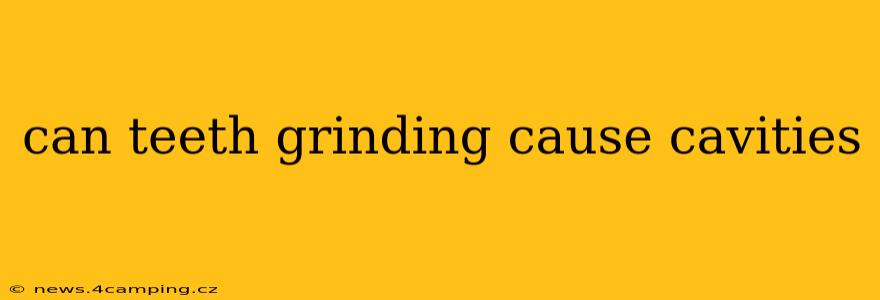Can Teeth Grinding Cause Cavities? The Surprising Connection
Teeth grinding, also known as bruxism, is a common condition affecting millions. While often associated with headaches and jaw pain, many wonder: can teeth grinding actually cause cavities? The answer is complex, and not a simple yes or no. While bruxism doesn't directly cause cavities, it can significantly increase your risk. Let's explore the connection.
How Does Teeth Grinding Damage Teeth?
Bruxism involves clenching or grinding your teeth, often unconsciously, during the day or night. This repetitive action puts immense pressure on your teeth, leading to several issues:
- Fractures and Chips: The constant pressure can cause your teeth to crack, chip, or even break. These weakened areas become more susceptible to bacterial invasion and cavity formation.
- Wear and Tear: Grinding gradually wears down the enamel, the protective outer layer of your teeth. This exposes the underlying dentin, which is much softer and more vulnerable to decay.
- Increased Sensitivity: As enamel wears away, your teeth become more sensitive to temperature changes and sweets.
- Gum Recession: The pressure from grinding can also push your gums back, exposing more of your tooth roots to decay.
Does Teeth Grinding Directly Cause Cavities?
No, teeth grinding doesn't directly cause cavities in the same way that sugary foods do. Cavities are caused by bacteria producing acids that erode tooth enamel. However, bruxism creates conditions that make cavity development much more likely. The weakened enamel and exposed dentin are prime targets for bacteria.
Can Stress and Anxiety Increase Cavities Due to Bruxism?
Stress and anxiety are often linked to bruxism. When you're stressed, you're more likely to clench and grind your teeth, exacerbating the risks mentioned above. While stress doesn't directly cause cavities, the increased teeth grinding it induces dramatically increases your susceptibility. Managing stress through techniques like meditation, yoga, or therapy can indirectly help protect your teeth.
How Can I Protect My Teeth from Cavities if I Grind My Teeth?
Protecting your teeth from cavities if you grind your teeth requires a multi-pronged approach:
- Regular Dental Checkups: Frequent visits to your dentist are crucial for early detection of any damage and prompt treatment.
- Nightguards: A custom-fitted nightguard can protect your teeth from the wear and tear of nighttime grinding.
- Stress Management: Addressing underlying stress and anxiety can reduce the frequency and severity of bruxism.
- Good Oral Hygiene: Maintaining excellent oral hygiene—brushing twice daily, flossing regularly, and using fluoride toothpaste—remains essential for preventing cavities, even with bruxism.
- Dietary Considerations: Limiting sugary drinks and snacks reduces the amount of acid-producing bacteria in your mouth.
Does Grinding Teeth Cause Tooth Decay?
Yes, while not a direct cause, teeth grinding significantly increases the risk of tooth decay. The damage it inflicts weakens teeth, creating entry points for bacteria and accelerating the decay process. Therefore, understanding the connection between bruxism and tooth decay is critical for maintaining oral health.
By addressing the underlying causes of bruxism and practicing excellent oral hygiene, individuals can significantly reduce their risk of developing cavities even with this condition. Remember, regular dental checkups are crucial for early detection and intervention.
